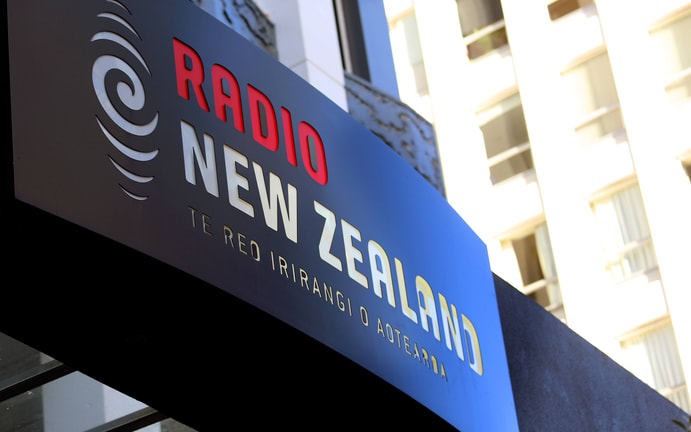RNZ is rethinking its approach to music, with a multimedia strategy to broaden its reach. Mediawatch asks what this will mean for RNZ audiences, and talks to an expert about what's working for public broadcasters overseas in the digital age.

Photo: RNZ / Diego Opatowski
Among many changes at Radio New Zealand recently, the broadcaster phased out its old name for the initials RNZ. This was to highlight its transformation from a mere radio broadcaster to a multimedia digital-age company - delivering audio, video and written work online and to mobile devices.
At RNZ National, Checkpoint with John Campbell has become “radio you can watch” on YouTube, Freeview TV or the RNZ website. So far, there’s nothing quite so elaborate for RNZ's music.
However, change is coming.
RNZ's music division has been restructured, with new jobs created and old ones cut. There are nine fewer people working there now, and some long serving staff have left. There have been investments in new systems and software for selecting, playing and storing the music heard on both RNZ Concert and National. There have also been changes in recent weeks to the presentation and schedule of programmes on RNZ Concert.
And last week, without any fanfare, a new name was launched: RNZ Music.
What is 'RNZ Music'?
Last year, a proposal for RNZ Music set out a vision for a "multimedia destination for New Zealanders who love music". The proposal said:
"Radio New Zealand has started the change process required for delivery of quality journalism, news and current affairs - but our approach to the delivery of music content remains in a time warp."
It identified “an internal culture of inertia” and warned that “delaying change and doing nothing will ultimately make us irrelevant to audiences who take their music seriously”.
The numbers

RNZ chief executive Paul Thompson Photo: RNZ
RNZ Concert's weekly audience is 152,000 - or 4% of the 15+ population. RNZ National's weekly audience is 488,000 and it also broadcasts music programmes including Music 101 and The Sampler. When restructuring was under way, RNZ chief executive Paul Thompson told Mediawatch last December RNZ Concert - and its classical music content - was not under threat.
"We looked at whether we should be more aggressive and introduce new genres but there is a very important role in looking after the [existing] audience," he said. "We are bringing all the music expertise in RNZ together into one plan. RNZ Concert is part of that."
Proposals refer to "lighter, more accessible" music and presentation, and going beyond the current "fine music" approach. RNZ is also aiming for an audience of 1 million by 2020. Will an 'RNZ Music' service playing a more popular mix of music be used to meet that target?
"That doesn't make sense to me at all," Mr Thompson said. "Why would we provide anything the commercial broadcasters are quite happily doing? I hope what we do will pull in more people - especially online - but I don't see it as a massive audience growth initiative."
He continued: "We're looking at it from an audience point of view, not from a view of what we've always done. But we're not looking for a significant change here ... Other genres have a place on Concert already, but the gap in the market and the uniqueness we can provide is focused on classical works."
Getting up to speed
The plan is to have the multimedia RNZ Music service up and running this year, with a new website offering video, written stories and access to the concerts recorded by RNZ.
Following this with interest will be Andrew Dubber, a New Zealander who has become an international authority in radio and music in the digital era.

Andrew Dubber Photo: supplied
Frustrated at not being able to stay in touch with New Zealand music though RNZ from overseas, he wrote a pretty spiky open letter back in 2005.
"Congratulations on the FM rollout," it said. "That’s the 1980s dealt with. But there is an even more profound shift that will inform the nature of everything you do as a content provider. Take it seriously."
At the time, RNZ was in a dispute with the recording industry about putting music online, and Mr Dubber complained bitterly about what he called “a crippled website that is, frankly, an embarrassment as it is, and an insult to the public of New Zealand".
His recommendation at the time? "Stream everything. Archive everything. Allow everyone to download any programme."
These days, RNZ does.
RNZ's charter doesn't say any particular genre of music should be fostered. But unlimited amounts of music are also available online from streaming services like Pandora and Spotify - as are countless music stations all over the world.
"We've just gone from two radio stations to the entirety of the internet. The question isn't 'what we should cut down on' but what more we can do," Mr Dubber said.
"There is no other radio environment like [New Zealand's] on the planet. The bandwidth is crowded but what most of the other stations are doing is in such a narrow band. RNZ could do nearly anything without treading on any toes at all."

